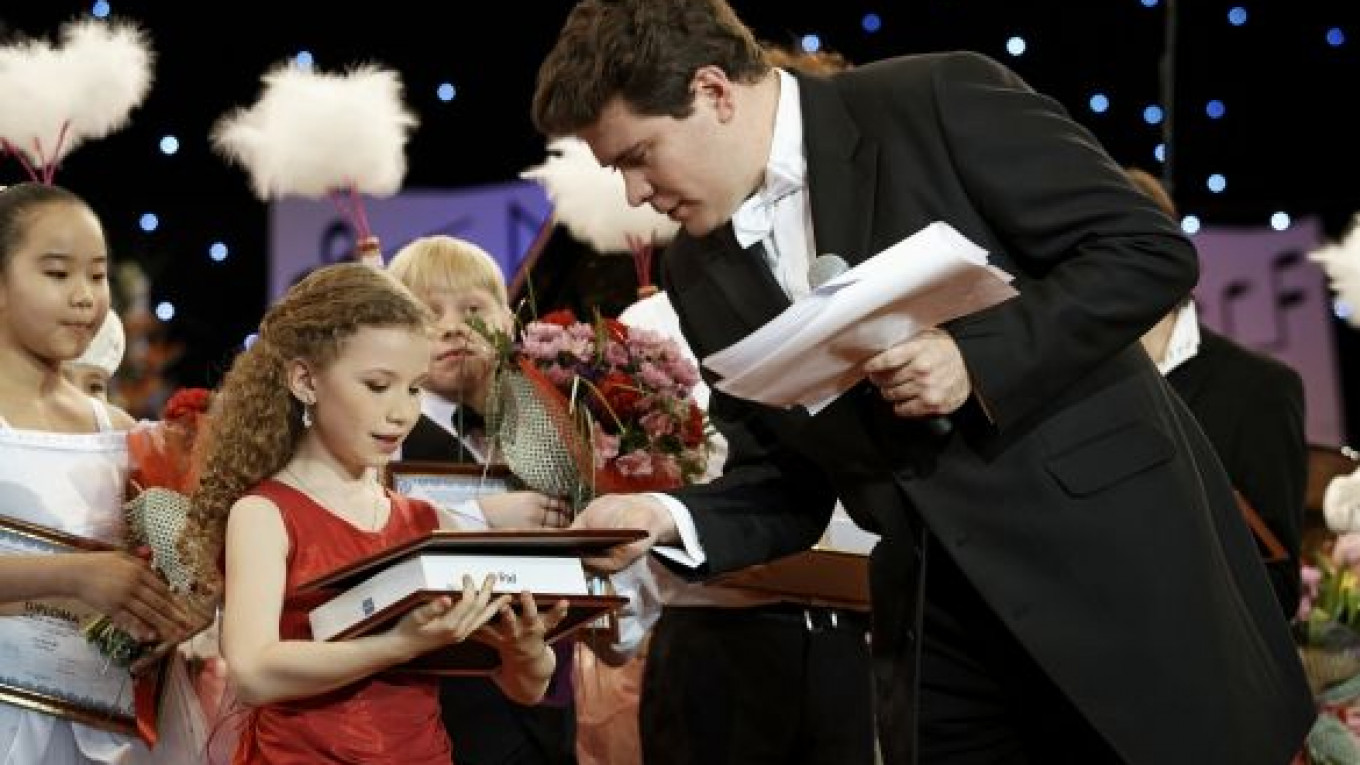Early last month, 11 prominent soloists of the Bolshoi Theater's ballet company, including four prima ballerinas, interrupted their brief vacation from the Bolshoi's stages to travel 5,000 kilometers eastward to Irkutsk for a pair of gala dance programs closing out the city's eighth annual "Stars on Baikal" music festival.
On the first of those evenings, however, it was not the dancers who made the last leaps across the stage. Following the final number, the curtain rose again and the dancers took their customary bows, greeted by the audience with a storm of cheers and applause. Eventually they were joined at the side of the stage by pianist Denis Matsuev, the festival's director and an extraordinarily popular figure in Irkutsk, the city where he was born and where he lived until his mid-teens.
Matsuev made a brief speech, warmly, and with a fine touch of humor, thanking both dancers and audience. Then, to the amazement of onlookers, he proceeded to take three gigantic leaps that covered nearly the entire width of the stage.
Having observed Matsuev at close range in recent months at three of the five festivals to which he provides artistic direction — in the Kazakhstan capital of Astana, at the edge of the French Alps in the resort town of Annecy and finally in Irkutsk — I found both that speech and those leaps an excellent illustration of the enthusiasm and energy he applies to whatever he touches.
In the 15 years since he took first prize in piano at the 11th International Tchaikovsky Competition, Matsuev, now 38, has risen to the foremost ranks of his profession. And not only has he become one of today's most sought-after musicians, but also one who surely counts among the most hard-working of all.
Matsuev calculates that over the past year he has made something on the order of 180 appearances as a pianist, appearing in solo recitals and with orchestras throughout Russia, Western Europe, the Far East and both North and South America. Taking into account the time required for practice, rehearsal and travel, plus the inevitable press conferences and interviews, a schedule like that would seem more than enough to fill the plate of any musician
But besides adding the direction of festivals to his agenda, Matsuev devotes considerable time to encouraging and supporting young musical talent, particularly by way of the Moscow-based New Names Foundation, of which he has been president for the past five years, as well as heading the Swiss-based Sergei Rachmaninov Foundation and serving as a member of the Russian President's Council on Culture and Art.
I have to admit that it took me some years to come to terms with Matsuev as a pianist. Together with many — perhaps even most — others who closely followed the 1998 Tchaikovsky Competition, plus a number of the piano jury members, I felt that the first prize ought to have gone to Englishman Freddy Kempff, who ended up taking third. According to one particularly outraged jury member, with whom I spoke just after the winners were announced, the award to Matsuev — then still a student at the Moscow Conservatory — and the second prize given to Moscow Conservatory alumnus Vadim Rudenko were essentially the result of an intense lobbying effort by another jury member, who also happened to be the teacher of both.
Matsuev still has his detractors, among them those who consider his playing too percussive and his manner more that of a showman than a truly serious musician. For my own part, I have gradually come to admire the special dynamism that he brings to his playing and to appreciate an ever-increasing degree of interpretive subtlety and sensitivity. Added to that is his remarkable ability, quite rare among present-day pianists, to reach out to his audiences and, in effect, include them in his performances.
I also have considerable admiration for the time, energy and even money from his own pocket that Matsuev devotes to promoting the careers of promising younger musicians. In a future article, I want to describe what I have observed of that, particularly over recent months at the festivals in Astana, Annecy and Irkutsk.
Next month, Matsuev makes two appearances in Moscow, both under the auspices of the Moscow Philharmonic Society.
On Nov. 15, he joins an all-star group of classical and jazz musicians, together with the Moscow Virtuosi chamber orchestra under the baton of its artistic director, Vladimir Spivakov, to honor the 70th birthday of bass viol player Grigory Kovalevsky, who helped to found the orchestra in 1979.
On Nov. 19, Matsuev can be heard playing Rachmaninov's Rhapsody on a Theme of Paganini with the Lucerne Symphony Orchestra from Switzerland, led by its young American principal conductor James Gaffigan.
The concerts of Nov. 15 and 19 both take place at 7 p.m. at Tchaikovsky Concert Hall, at 4/31 Triumfalnaya Ploshchad, metro Mayakovskaya. Tel. 8-495-232-5353.
Contact the author at [email protected]
A Message from The Moscow Times:
Dear readers,
We are facing unprecedented challenges. Russia's Prosecutor General's Office has designated The Moscow Times as an "undesirable" organization, criminalizing our work and putting our staff at risk of prosecution. This follows our earlier unjust labeling as a "foreign agent."
These actions are direct attempts to silence independent journalism in Russia. The authorities claim our work "discredits the decisions of the Russian leadership." We see things differently: we strive to provide accurate, unbiased reporting on Russia.
We, the journalists of The Moscow Times, refuse to be silenced. But to continue our work, we need your help.
Your support, no matter how small, makes a world of difference. If you can, please support us monthly starting from just $2. It's quick to set up, and every contribution makes a significant impact.
By supporting The Moscow Times, you're defending open, independent journalism in the face of repression. Thank you for standing with us.
Remind me later.






